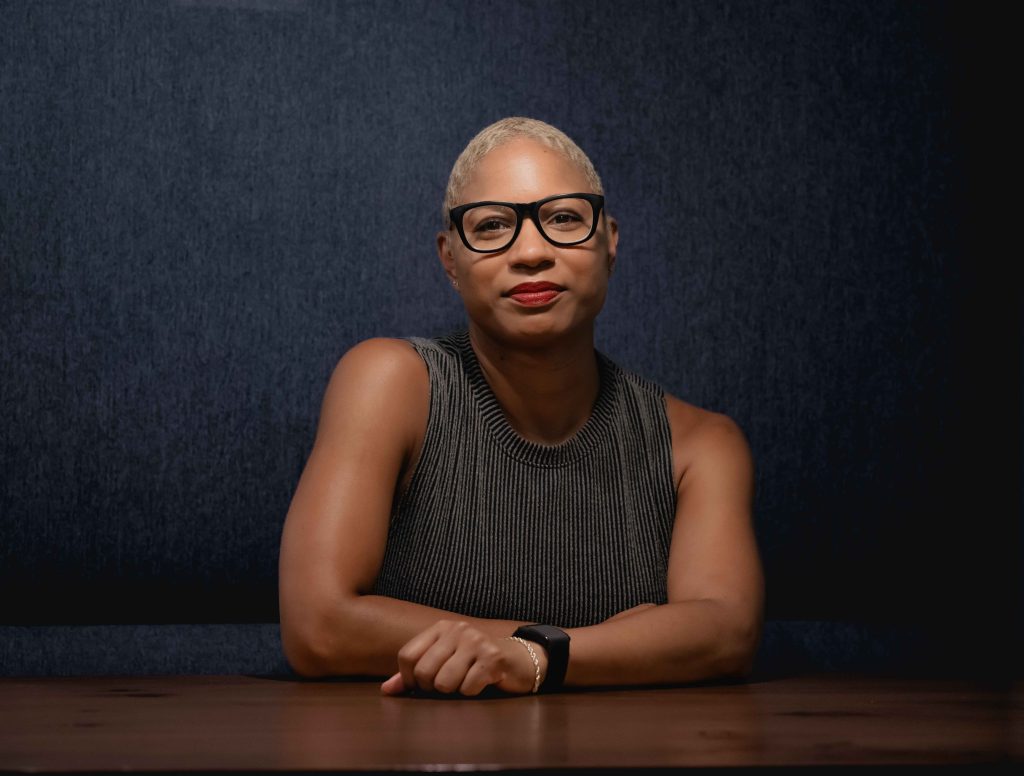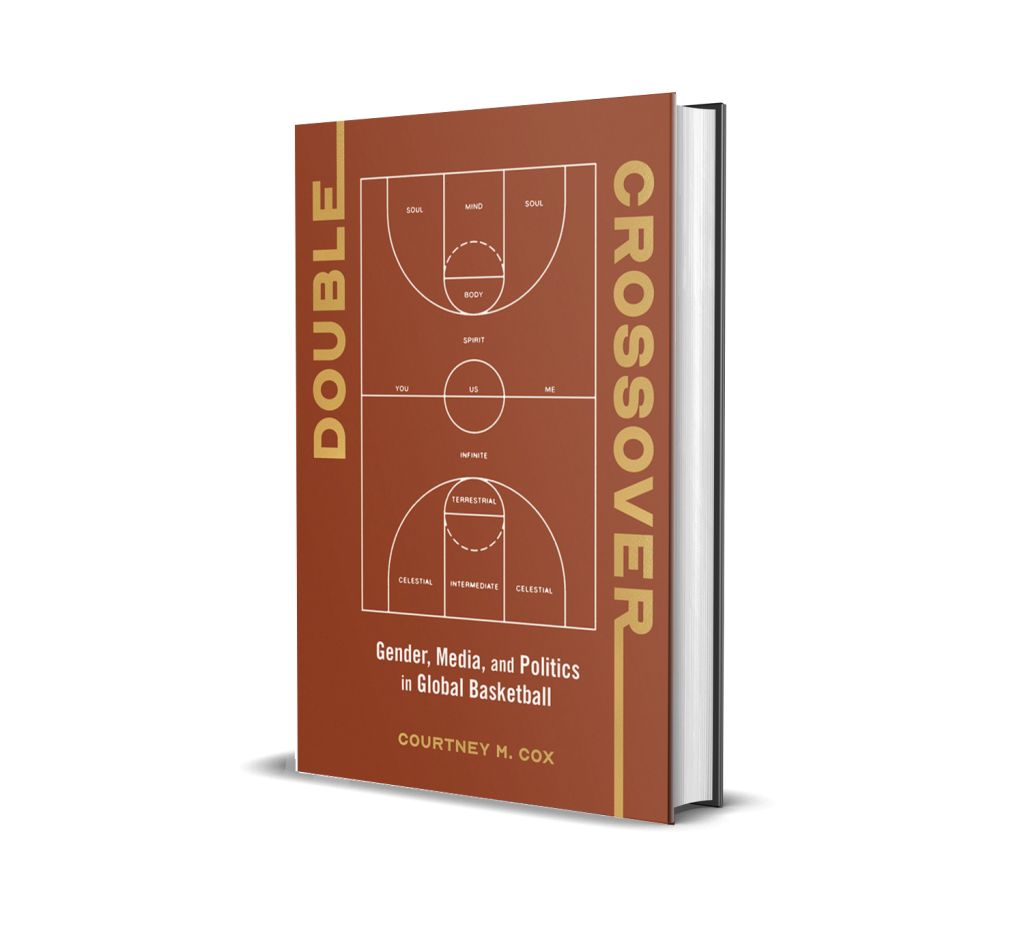Courtney M. Cox, author of Double Crossover: Gender, Media, and Politics in Global Basketball, answers questions about her new book.
Q: Why did you decide to write this book?
I moved to Los Angeles in 2013 and began attending WNBA games at STAPLES Center. It was my first time living in a city with a W team, and I couldn’t get enough of everything happening in this space. At that time, I didn’t know it would become the focus of my doctoral research – I just wanted to be a part of the WNBA fan community and learn as much as possible about the sport. In 2015, I worked for the Los Angeles Sparks for a season as an intern, an experience that left me with more questions than answers regarding how the WNBA is marketed and mediated. My time with the Sparks allowed me to meet athletes and team employees and observe them day-to-day within an organization. It is where I first met Cierra Burdick, who really informs so much of this book across each chapter. As a newly drafted WNBA rookie, she was already comparing her collegiate career and her prospects as a pro; she had already signed a contract to play in Italy during the offseason. I realized then that to really tell a story of women’s basketball, I needed to think about many different sites within the United States and abroad, an epiphany that really drove my dissertation research, the earliest iteration of what is now this book.
Q: What is the most interesting discovery you made while researching and writing your book?
This book is strewn all over the place. It moves from online spaces – Instagram, Zoom, YouTube – to offline ones, spilling out into arenas and weight rooms, moving via several modes of transportation and across state and national borders. However, it’s so very interconnected in essential ways. This aspect is helpful for me as a researcher seeking out who to interview or where I should travel next. Folks compete with each other in one country and on opposing teams in another one, all within this same calendar year; they remember what happened during that one Sweet Sixteen matchup in college. They are romantically and/or financially involved. Studying this world is communal, collaborative, and sometimes very messy.
Q: What myths do you hope your book will dispel or what do you hope your book will help readers unlearn?
Various companies and outlets have done a fantastic job dispelling the myth that women’s sports aren’t exciting, valuable, or worthy of financial investment. There is work left to be done for sure. From where I stand, it’s also vital for us to see women’s sports, specifically basketball, as a fascinating site of intellectual inquiry. I hope readers, especially those within the academy or journalism, can unlearn normative ideas surrounding the technical prowess and political thought of the interviewees that inform this project. The athletes and advocates of this game are about their craft; they are well-read and well-traveled and have so much to offer us. I hope folks within sports studies feel motivated and encouraged to engage more with those within the industry. I hope folks studying race and gender from other vantage points – music, art, film, design – see sport as a peer in studying culture.
Q: Which part of the publishing process did you find the most interesting?
It may be the subject of this book, but by far, the most exciting and challenging part of publishing this project has been keeping up with the headlines in the final stages of writing; it’s a weird and fun time to complete a book on women’s hoops. I graduated with my PhD in 2019, and at the time, I was still figuring out how to imagine the dissertation as a book. Around the time I finally decided to work through my ideas around transnational sporting labor, the COVID-19 pandemic took hold, and everything I had written or researched felt instantly dated. The chapter I was writing at that time, on the 2019-2020 Oregon women’s basketball, had no real ending, given the abrupt stop of the season. In the years that followed, the transfer portal, NIL, Brittney Griner’s detainment, and the Kaplan Report constantly required me to rethink my framing and the structure of this project. Until the final day the full manuscript went into production, I was trying to capture “the moment” and eventually had to make peace with where this project ended. I’m most interested in how the book will be received (by athletes, scholars, and fans) in this dynamic moment in the sport’s history.
Q: What is your advice to scholars/authors who want to take on a similar project?
For those who are doing mixed-methods research or any long-term project, I think the number one thing I would suggest is staying organized! I am constantly screenshotting, emailing myself articles, and using my Notes app; unraveling all of it and making it make sense in a Word document alongside interviews and field observations is not easy. Develop a system early and stick to it.
For those pursuing similar areas of work within sports studies, I suggest expanding beyond sports-centric literature to enhance their contribution to our field. Performance Studies and Black Studies informed my approach, but I think studying sport could involve a range of fields and specialized areas.
Finally, for those studying the experiences of Black folks within any space, I think there is a need to apply a holistic view of blackness, moving beyond pain or oppression to moments of joy, clarity, and complexity. I think it is so important to show the range of what it means to survive and even thrive under white supremacy.
Q: What do you like to read/watch/or listen to for fun?
When I am not reading, watching, dreaming, or listening to sports-related content, I am consumed with the world of wine. I am currently a Wine & Spirits Education Trust (WSET) candidate, so I spend a lot of time studying maps, blind tasting, and reviewing wine-related notecards. In the future, I’m really interested in blending basketball and wine together in a more serious way, but for now, it’s a hobby and a space for me to think through a lot of the same issues of labor and identity in a different context. That means I also read a lot of wine books and listen to many wine-related podcasts when I’m doing dishes or walking my dog.
For the past couple of years, I’ve also been a part of a virtual book club started by my friend Perry B. Johnson. Every month, we read books about music – memoirs, biographies, or any deep study of the creative process or the business side of the industry. It’s a fun way to connect with a brilliant group of folks. We have scholars, journalists, and creatives on the call, and, every once in a while, the author of the book!

Courtney M. Cox is an assistant professor in the Department of Indigenous, Race, and Ethnic Studies at the University of Oregon and the co-director of The Sound of Victory, a multi-platform digital humanities project.

